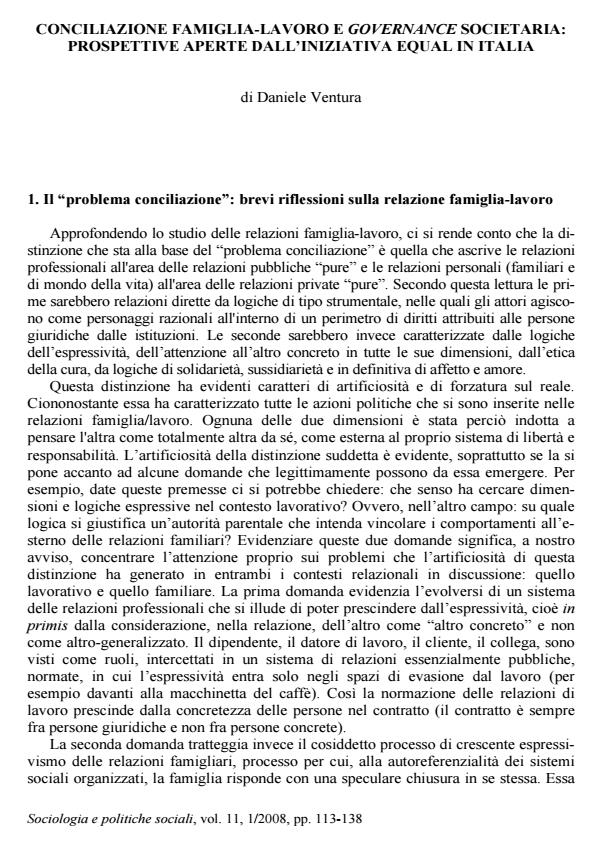Conciliazione famiglia-lavoro e governance societaria: prospettive aperte dalliniziativa equal in Italia
Titolo Rivista SOCIOLOGIA E POLITICHE SOCIALI
Autori/Curatori Daniele Ventura
Anno di pubblicazione 2008 Fascicolo 2008/1
Lingua Italiano Numero pagine 26 P. 113-138 Dimensione file 180 KB
DOI
Il DOI è il codice a barre della proprietà intellettuale: per saperne di più
clicca qui
Qui sotto puoi vedere in anteprima la prima pagina di questo articolo.
Se questo articolo ti interessa, lo puoi acquistare (e scaricare in formato pdf) seguendo le facili indicazioni per acquistare il download credit. Acquista Download Credits per scaricare questo Articolo in formato PDF

FrancoAngeli è membro della Publishers International Linking Association, Inc (PILA)associazione indipendente e non profit per facilitare (attraverso i servizi tecnologici implementati da CrossRef.org) l’accesso degli studiosi ai contenuti digitali nelle pubblicazioni professionali e scientifiche
Family/work reconciliation and societal governance: New chances for Italy coming from Equal Initiative (By Daniele Ventura) - ABSTRACT: The concept of family/work reconciliation by now defines all the policies that try to harmonize the times, spaces and relations of working life with the times, spaces and relations of family and personal life. The modern organization of European welfare systems, centred (above all the national categories that many times have been focused) on the Private-Public dialectics, has made up a reconciling policy system based upon the incentives & sanctions model. This policy framework for reconciliation is becoming less sustainable every day for it is showing efficacy and efficiency problems, especially in Italy. The essay we’re presenting is an application of the relational framework of analysis to the cultures, politics and policies of work-family reconciliation, as they have developed in Italy in the last years. The relational analysis upon the politics of fam219 ily/work reconciliation allows us to underline the presence of some paradoxical trends that frequently lead to perverse effects of the policies. But it also focuses on the occasions and the valuable points in them. The critical analysis of the present of reconciliation policies in Italy is based on a relational-normative assumption: in order to generate an effective and positive reconciliation a welfare system needs to build and sustain networks and governance models between public, private and societal dimensions involved in the problems. These networks should be oriented to the valorisation of family relations and family/work relations as relational goods and social capital generators (this is, in synthesis, what we mean by societal governance). The empirical section of the essay presents a synthesis of two case studies made upon two experimental and local models of family/work reconciliation. Both of them were developed in the first phase of the EU Equal Initiative, a wide policy program that for the first time brought in Italy the occasion to project and develop reconciliation policies through the interaction of public, private and societal actors. The case studies aim to highlight the features of these partnership models, the family/work reconciliation cultures they were bringing on and the resources, chances and obstacles they had in order to move towards societal governance systems.
Daniele Ventura, Conciliazione famiglia-lavoro e governance societaria: prospettive aperte dalliniziativa equal in Italia in "SOCIOLOGIA E POLITICHE SOCIALI" 1/2008, pp 113-138, DOI: